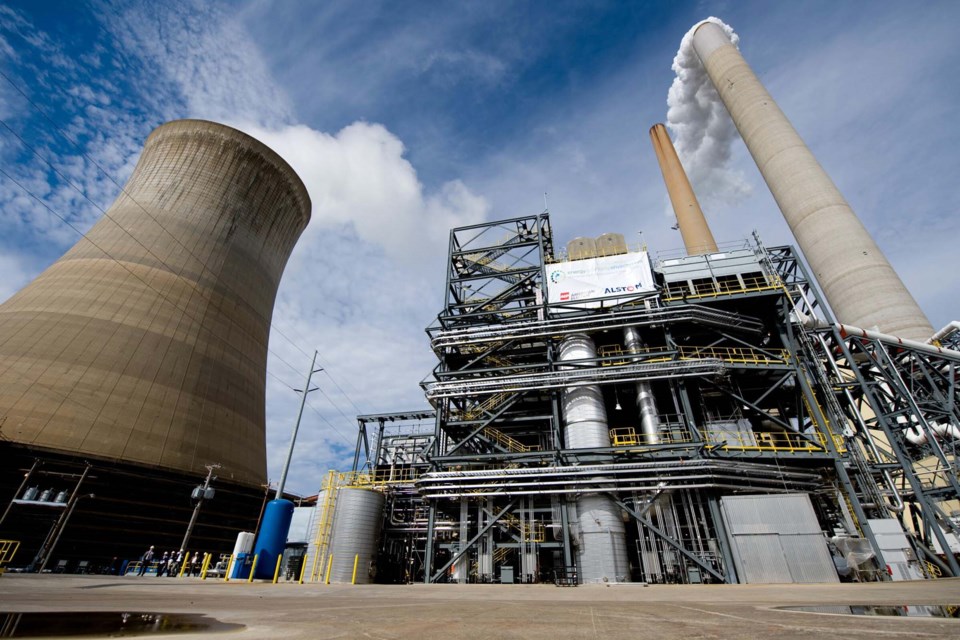Oil companies are not investing in clean energy projects to help reach their climate pledges despite record profits last year, according to a new report from an energy think-tank.
Last week, the Pembina Institute released a report that showed the Pathways Alliance, an industry group representing 95 per cent of production in Alberta’s oilsands, has not made any significant decarbonization investments from its members.
The institute looked at the promises the Pathways Alliance made and compared them to the actions the companies have taken so far to reduce their carbon footprint.
But the Pathways Alliance group, which represents Suncor, Cenovus, Conoco Phillips, Canadian Natural Resources Ltd., Imperial Oil, and MEG Energy, said the expectations by the Pembina Institute are unrealistic and they will not be making final investment decisions on multi-billion-dollar projects before the federal government has finalized the regulatory frameworks to support them.
The Pathways Alliance umbrella group was formed in June 2021 and has a goal of achieving net-zero greenhouse-gas emissions by 2050.
Chris Severson-Baker, executive director of the Pembina Institute, said the report is calling attention to the fact that, to date, no tangible actions have come out of the announcement to get to net zero by 2050.
“At a time when companies are reaping record profits, now is really the time to be making investments in decarbonization for these companies, but we're not seeing that right now,” Severson-Baker said, adding this positions companies to start making investment in decarbonization.
“Clearly there is a need for the government to follow through with its cap on emissions from the oil and gas sector [overall] and policies that drive a decline in emissions in order to get us to that net-zero target.”
To reach the 45-per-cent emissions reduction target by 2030, a goal set out by the federal government, Severson-Baker said the capital investments must start now.
Regulatory filing and conversations with shareholders must begin to make the plans material, Severson-Baker said, and Pembina is trying to call attention to the fact that this hasn’t happened yet.
“We're really trying to call attention to the fact that we're just not seeing the kind of behaviour from the companies that you would expect if they were genuine about following through with these plans,” Severson-Baker said.
Currently, there are some low-hanging fruit projects the industry can tackle to help reduce their emissions, Severson-Baker said, including controlling their methane emissions.
Facilities can also decarbonize in areas by using electricity in areas currently powered by burning fossil fuels, such as with pumps and motors, Severson-Baker said.
Some of the big changes needed are facilities for carbon capture, utilization, and storage (CCUS), Severson-Baker said, and industry can also switch from using solvents instead of using natural gas to create steam to inject into operations to extract oil.
One of the key pillars of the Pathways Alliance plan to get to net zero is the use of CCUS to force carbon dioxide emissions deep into the ground to keep them out of the atmosphere, and includes a 400-kilometre pipeline that will carry carbon from Fort McMurray to Cold Lake.
The Pathways Alliance has put a suite of solutions in its plan to reduce its carbon emissions by 22 megatons by 2030, but companies are not starting the process of making those investment, Severson-Baker said.
So far, no company in the Pathways Alliance has announced any new carbon capture facilities, and none have plans in place to show they will use the CCUS facilities to reduce emissions to meet their pledges.
Instead of making these investments, the cash these companies have earned from high oil prices this year has gone into to buying back shares to prop up their share prices, Severson-Baker said.
But the Pathways Alliance says significant work is underway among its members, including the submission of a comprehensive application to the Government of Alberta for underground storage (pore) space for its proposal to construct one of the world’s largest carbon capture and storage (CCS) projects, said president Kendall Dilling in an emailed statement.
Engineering studies on the alliance's foundational CCS project is currently underway, which includes specific capture facilities, Dilling said.
Some of the necessary policies and regulations haven’t been implemented, Dilling said, including the federal government’s Investment Tax Credit for CCUS and the carbon contracts for differences — a guaranteed price floor for carbon.
Decarbonization projects in Canada are competing for money with similar projects in the U.S., said Dilling, which now have a significantly more favourable investment climate thanks to the recently introduced Inflation Reduction Act in the United States.
But the tax credit announced by the federal government is around 50 per cent for carbon capture and a lower percentage for transportation, Severson-Baker said, and companies have been “quite public” that the federal cash isn’t enough for them to make these types of investments. However, the federal government has been clear there will be no further public investment in CCUS.
“[The] Alberta government has also indicated that they wouldn't publicly subsidize those types of projects further,” Severson-Baker said.
As these companies continue to use their profits to help buy back shares and pay dividends rather than invest in decarbonization, Severson-Baker said there will need to be government intervention to force companies to follow through on their pledges.
The Pathways Alliance said its members remain confident that continued collaboration with governments will enable a fiscal and policy framework that is required for the industry to proceed to final investment decisions, Dilling said in an email.
“However, doing so prematurely without having that framework in place would put climate goals, jobs, investment, and energy security at significant risk.”




